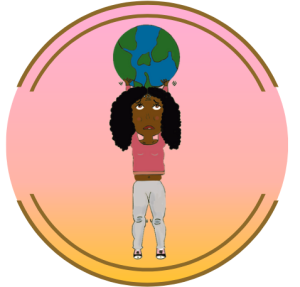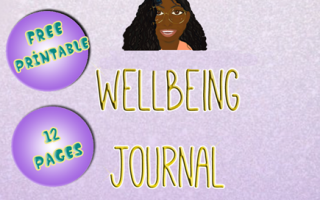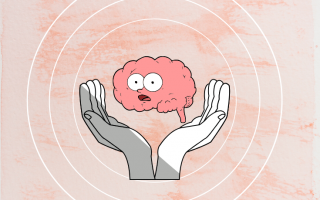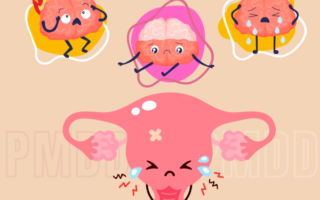How digital technology has changed the way we behave
—–
It was the long-awaited end of 2020 and at 11.30 pm I was in bed in a post-Pringle devouring coma. Unlike other times when I wanted to sleep through the countdown to the New Year in protest against paying higher fees for the pleasure of having my feet stomped on by a man whose dancing closely resembles a Transformer in mid-transformation, I was apathetic: New Years Day was, well, it was just another day.
The pandemic would still be here and the thing I wanted to do the most, hug my nephew while he cries and makes a break for freedom, would still be a thing of dreams.
At 11.40 pm I had a change of heart; I might be miserable but I’d be miserable with a glass full of martini.
At 11.50 pm I was giving the Christmas tree a rousing rendition of Jamiroquai singing Virtual Insanity. The tree, along with my parents, did not give the standing ovation I deserved but you know, haters gonna hate.
I forgot all about this until a few days ago when Jamiroquai’s Virtual Insanity started blaring out from the radio.
Future’s made of virtual insanity now
Always seem to, be governed by this love we have
For useless, twisting, our new technology
Oh, now there is no sound – for we all live underground
I wasn’t born into the modern tech boom. I am, however, young enough not to share every news article on social media and accidentally fall into a cult but old enough to have used a floppy disk. It’s been a long time since then and now here we are: in doomsville.
To be clear, I don’t think the days of dial-up modem were better. I’ll never go back to that, you hear me? Never! I – along with a large percentage of the population- have massively benefited from advancements in technology in general. Technological innovation has positively affected a wide range of industries globally, has improved medical access and efficiency, and made it easier for us to connect with each other.
However, my excitement over digital technology in particular has waned. I’m sure I’m not the only one. As I sit here listening to Anderson Paak crooning on Spotify, I do so knowing that I willfully traded having a physical copy of music I paid for one time in favour of paying a fee each month to essentially rent a compilation of tunes I’ve put together over the years.
Having a Netflix account means that instead of buying a movie to put on the shelf, I have thousands of movies and programmes to scroll through until I inevitably get tired and fall asleep or hop over to YouTube, Instagram, or God forbid, Twitter.
I’ve swapped taking photos one time and getting them developed for taking one photo ten times at different angles until deciding that all of them are ugly anyway and deleting the whole thing.
We’re arguably at the peak of digital tech – social media in particular – and it’s held up a mirror to some of humanity’s ugliest traits: envy, greed, cruelty, willful ignorance, bigotry – all of which can be monetized, hurray!
This isn’t a rant against digital tech/social media, it’s more of an observation and I suppose, a question: how has digital tech altered our behaviour? And was it inevitable that we would lose our sense of agency to it?
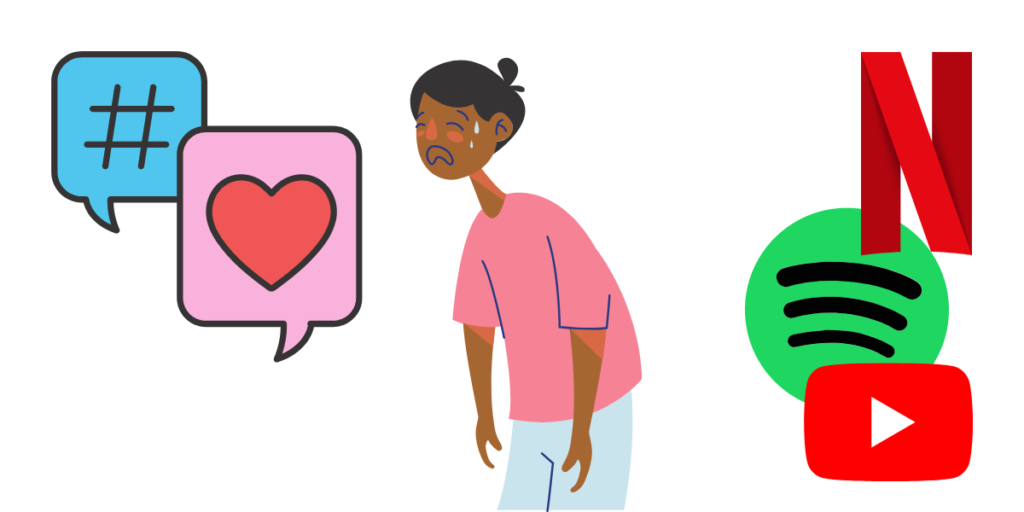
A simple explanation is that, like the quill when the typewriter came around, something new and more accessible replaced something old. Going to the cinema (pre-covid) isn’t cheap so a company offering a less expensive alternative from the comfort of your own home has mass appeal (Netflix/Amazon Prime/Disney+)
Music retailers that were once plentiful went into rapid decline when people started ripping music from the internet (illegally) for free. Music streaming platforms reluctantly, with a lot of nudging from stars like Taylor Swift, found a way to compensate artists and still give consumers access to all the music they could get their smelly ears on.
So what’s the problem?
There’s the fact that we’re at the mercy of streaming services when they go down or if they for whatever reason get shut down for good. Oh, you wanted to watch Shitts Creek again? Well shut your eyes and dream of genie, your plans are off mate. You want UberEats? The system is down, enjoy your cold burger you lazy bugger.
Did you want to play your carefully timed playlist on your morning run? Haha! Nope! Sit down and eat your porridge, pick up your smartphone and doom-scroll through the social media apps to see what everyone and their pet parrot has to say about literally everything: cats vs dogs, that celebrity that did that thing that time, sexism, racism, fascism, communism, if climate change is real, if science is real, if we are real, whose had a baby, who hasn’t and why not? Who’s lost weight, and who’s gained it in their face and neck but not on enough on their butt.
I say all this with an active Twitter, Instagram and Facebook account (the latter two for business). I’m a material girl in a technical world. Nobody is forcing me to use these things and if it’s so bad then why do I -and so many others – find it hard to leave?
Persuasive technology and design
Technology has changed the way we act and think. Most of us know this already and accept it in the same way we accept that death is an inevitability but let’s look a little deeper.
Look at the apps on your smartphone; some of them will help you to develop healthier habits (step counter, screen-time monitors, etc) and some not as much (platforms that invoke feelings of loneliness, FOMO, low self-esteem). Most of them, if not all of them use persuasive technology, a feedback loop that encourages you to return.
Persuasive technology and design, fundamentally, is about creating digital environments that modify certain parts of a users’ psyche, better than the real world equivalent does. Siona Singletary
So check this right: humans have created computer systems that change parts of the way our brains are wired in order to make our online experience more compelling than our real-world experience.
The real world is tough and humans are, by design, complex. Social media built on persuasive technology simplifies this with quick and easy responses that trigger our dopamine.
Dopamine is a chemical messenger in our brains that transmits feelings of pleasure and reward; feelings that trigger us to repeat a particular set of behaviours. Attention in the form of likes and comments, sometimes even bad comments, generates a feedback loop of dopamine: Action turns to reward, the reward becomes an addiction.
Okay so now, let’s add a dollop of an algorithm to the recipe.
An algorithm in simple terms “is the list of instructions and rules that a computer needs to do to complete a task.” Spotify uses algorithms to recommend music you might like based on the music you have listened to which encourages you to return/use their services for longer. Okay, cool beans, it’s like – a predictive model, right; you do this thing so you’re probably gonna be into that thing.
Thing is, algorithms are not a fail-safe for human behaviour although it’s being treated as such. For example, in 2020 an algorithm was used to make a prediction of students’ A-level exam results in the UK with devastating results. Information wasn’t just based on past grades but also on where students live. Students who were getting As were given Cs and Es as their final result.
Alright now, let’s put this altogether:
What we do online is monitored and stored (data). Perhaps you start liking comments/posts on social media expressing an opinion against a certain group/s. The algorithm says, oh hey there, buddy! You seem like you want more of this- hop into this echo chamber.
You start sharing similar views and the dopamine rush you get from people liking encourages you to keep doing it.

Maybe you start searching online for theories that back up your opinion (gotta provide that content, baby) and now you notice ads encouraging you to buy things because your data (you essentially) is being sold to ad agencies to make corporations profit. An algorithm predicts your political leanings and shows you news sources that encourage you to vote a particular way.
Your actions and behaviour now align with a community that, without you doing a whole lot, lives in an easily provoked echo chamber, out of touch and distracted from reality. Of course, everybody isn’t affected by persuasive technology to the same degree but we are being manipulated. This is intentional. This is by design.
“Cyberspace has colonized the real world.” – William F Gibson
Remember, this isn’t about whether or not digital technology/social media is bad or good, we already know the pros and cons; it’s an observation of how our behaviour has adjusted and whether it was inevitable.
I’ve used the word inevitable approximately four times kinda like how Agent Smith, a computer program in The Matrix, consistently refers to himself as being an inevitability. Neo, the hero, defeats him by exercising his agency to make a series of choices and believing in himself.
On deeper inspection, he merely trades one system of control for another. The red pill he takes that wakes him up in the “desert of the real” and has him fighting his robot overlords was also pre-designed.
I wonder if the complexity and our dissatisfaction with one system of control (government, heavy consumerism, working for corporate overlords, and acceptance from our peers) made it inevitable that we would jump into another form of control, one that goes to great lengths to make us think that we’re not being controlled at all.
One where our lives become a construct of reality, where we can share intimate parts of our lives, and our unfiltered opinions without consequence (usually) for that sweet, sweet hit of dopamine we get from a simplified form of social acceptance.
Last week’s news rotation was particularly heavy . There was the search for Sarah Everard later revealed to be a murder at the hands of a police officer, and a literal royal rumble. Then a vigil turned violent, how black is too black for a baby, and a lot of arguments made in defense of “casual racism” (racism on the weekends, I guess?). Also, a crime bill that would help to undermine the legality of protests.
The opinions and clips online were so bleak that I felt, not for the first time, a sinking feeling in my chest. I’ve seen some wild stuff online but, maybe because of the isolation I feel in this pandemic, it troubled me deeply. Thousands of brutal “hot takes” were shared and liked by thousands of other people, everything was and still is up for debate including how worthy you are of existence.
And who benefits in the long run? What’s the price for removing humanity from being human? Zuckerberg, Dorsey, and Wojick might say it’s somewhere between billions and trillions of dollars.

Matrix’s Neo might have unknowingly traded one system of control for another but the truth still remains that he exercised his agency by making choices and making changes: there’s an element of freedom in that.
You know that your brain is being rewired to form a reliance on technical devices and programming in the same way that we’ve formed a reliance on consuming material goods to numb our sense of satisfaction (which reminds me, I have a shop which you should totally buy stuff from so I can live like my idol, Scrooge McDuck). You know that the aim is to make us believe that the illusion of reality is better than reality itself.
You know that people are getting paid (a lot) to do it. Perhaps you already knew.
Awareness helps us to make more informed choices but as the saying goes, “ignorance is bliss.” The choice is ours to make. Will you choose to change the way you engage with this virtual insanity?
Do enough of us even want to?
